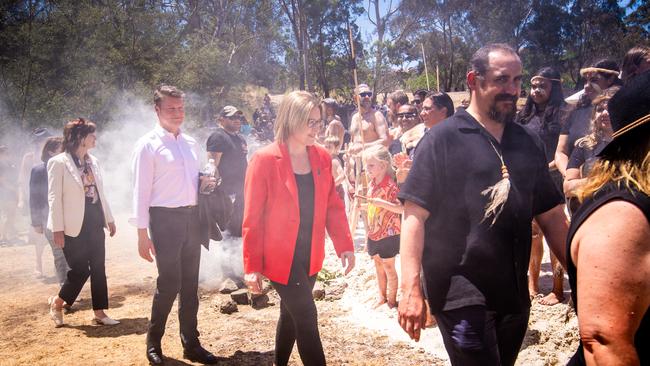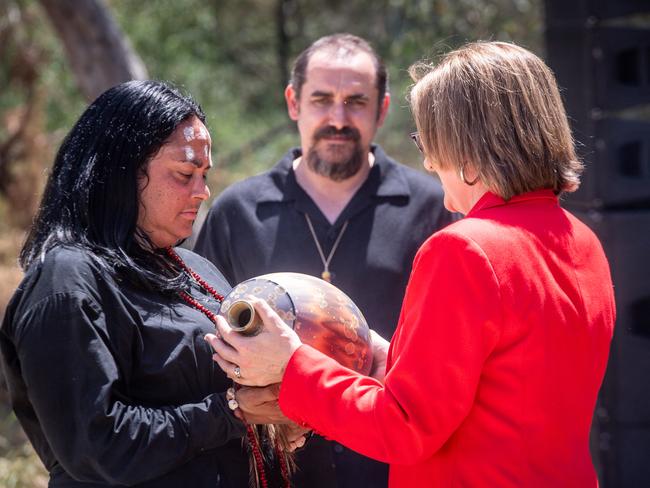First Nations advocates claim to have been locked out of Treaty talks
Indigenous advocates claim they’ve been told not to talk publicly about ongoing Treaty negotiations and to scrub social media of contentious content to avoid public backlash before a deal is done.
Victoria
Don't miss out on the headlines from Victoria. Followed categories will be added to My News.
Indigenous advocates claim they have been told not to talk publicly about ongoing Treaty negotiations and to scrub their social media of contentious content to avoid public backlash before a deal is done.
The nation-first Treaty negotiations kicked off officially on Thursday between the First Peoples’ Assembly of Victoria and the Allan government, but have already become mired in controversy.
Assembly members told the Herald Sun the negotiations were being kept top secret, and the public and assembly members were locked out.
“All assembly members should be sitting at the table and negotiating,” one member said, speaking anonymously.
“We are quite capable as sovereign people of this nation to negotiate our own outcomes.”
They added that the lack of transparency would cause a wider “fallout” if Victorians were also excluded from the process.
“We’ve been told to stay quiet, do not speak about the negotiations, clean our socials up and don’t talk to media,” they said.
Concerns have also been raised about former Labor staffers and current Victoria departmental employees being actively involved in treaty negotiations on behalf of the assembly.

The Herald Sun has confirmed that Prue Stewart, who has previously worked in former Aboriginal Affairs Minister Gabrielle Williams’ office, is now leading negotiations for the assembly.
A separate Indigenous advocate said her appointment was causing angst in the Indigenous community.
However, First Peoples’ Assembly of Victoria co-chairwoman Ngarra Murray said: “The First People’s Assembly of Victoria has worked hard over the last five years and its elected members are confident ahead of negotiations.
“We have a capable and diverse staff to support us on the treaty journey.”
The cloud over negotiations comes as wider backing for treaty in Victoria has waned in recent months.
The Victorian Opposition retracted its support earlier this year, raising concerns about state cultural heritage laws and the lack of transparency in the negotiation process.
Insiders also revealed that the broader view of the treaty had become “toxic” after the failed federal referendum in October, in which 60 per cent of Australians voted No to a Voice to Parliament.
Although Victoria had the highest Yes vote in the country, 54 per cent still voted against it.
Concerns over the treaty have also been particularly heightened recently after Parks Victoria closed half of the climbing routes of Mt Arapiles-Tooan State Park in November, citing cultural heritage protections without wider public consultation, and stated it was unable to release the report that was relied upon to close the routes.

On Thursday, Premier Jacinta Allan refused to reveal what was on the table.
“I’m not going to rule things in or out here today,” she said. “We will have those negotiations at the table.
“I’ll just reiterate that we come to the table firmly committed to treaty … There will be points of difference, I’m sure, along the way. There will be points that we agree on, there will be points that we disagree on, but that’s the purpose of the negotiation framework.”
It’s understood the assembly wants a statewide treaty inked by mid-next year, but will be keeping a low profile publicly about ongoing negotiations to avoid backlash.
The deal will likely include acknowledgment of Indigenous land of significance, agreements on new policies to close the gap, and the handing over of some crown land.
Concurrently, the government will begin negotiating with individual Indigenous groups, probably involving more contentious repatriations and land deals.
Originally published as First Nations advocates claim to have been locked out of Treaty talks



